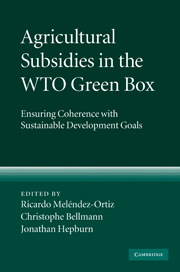Book contents
- Frontmatter
- Contents
- List of contributors
- Preface
- Acknowledgements
- List of abbreviations
- 1 Overview
- PART I The recent evolution of agricultural trade policy reform
- PART II The focus, extent and economic impact of green box subsidies
- PART III Green box subsidies and developing countries
- 11 Agricultural subsidies in the WTO green box: opportunities and challenges for developing countries
- 12 Use of green box measures by developing countries: an assessment
- 13 A Chinese perspective on the green box
- 14 African countries and the green box
- PART IV Green box subsidies and the environment
- PART V Looking forward: how can change take place?
- Appendix: Text of Annex 2 of the WTO Agreement on Agriculture (“the green box”)
- Index
14 - African countries and the green box
from PART III - Green box subsidies and developing countries
Published online by Cambridge University Press: 03 May 2010
- Frontmatter
- Contents
- List of contributors
- Preface
- Acknowledgements
- List of abbreviations
- 1 Overview
- PART I The recent evolution of agricultural trade policy reform
- PART II The focus, extent and economic impact of green box subsidies
- PART III Green box subsidies and developing countries
- 11 Agricultural subsidies in the WTO green box: opportunities and challenges for developing countries
- 12 Use of green box measures by developing countries: an assessment
- 13 A Chinese perspective on the green box
- 14 African countries and the green box
- PART IV Green box subsidies and the environment
- PART V Looking forward: how can change take place?
- Appendix: Text of Annex 2 of the WTO Agreement on Agriculture (“the green box”)
- Index
Summary
African perspectives on the green box measures
A major concern of African countries with regard to the implementation of the Agreement on Agriculture and green box measures is the need to ensure that the measures made recourse to indeed have no or minimal trade- or production-distorting effects. The need to instil discipline in the use of the green box measures has been a recurring theme in all of the proposals and statements made by African countries on the issue. African countries have made individual submissions on the green box measures or have joined developing countries from other regions to make submissions. One of the early views expressed by the African Group in the WTO on the green box measures is found in the Joint Proposal on the Negotiations on Agriculture presented by the Group in March 2001. It was proposed that the criteria for the green box should be tightened to ensure that measures that were employed had no or minimal trade- or production-distorting effects. The members of the West African Economic and Monetary Union (WAEMU) in 2002 noted the increase in the use of domestic support measures by developed countries because of box shifting. The appropriateness of decoupled support as a green box measure was raised in that submission. Egypt, Uganda and Zimbabwe presented a paper jointly with Cuba, the Dominican Republic, Sri Lanka and Honduras in which they identified direct decoupled payments and export credits and guarantees as measures which must be removed from the green box.
- Type
- Chapter
- Information
- Agricultural Subsidies in the WTO Green BoxEnsuring Coherence with Sustainable Development Goals, pp. 412 - 424Publisher: Cambridge University PressPrint publication year: 2009
- 1
- Cited by

